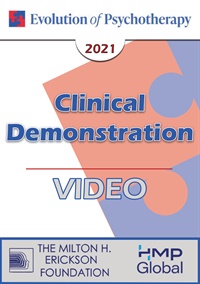
- Average Rating:
- Not yet rated
- Topic Areas:
- Clinical Demonstrations | Generative Psychotherapy | Psychotherapy | Art and Creativity
- Categories:
- Evolution of Psychotherapy | Evolution of Psychotherapy 2021
- Faculty:
- Stephen Gilligan, PhD
- Course Levels:
- Master Degree or Higher in Health-Related Field
- Duration:
- 1 hour
- Format:
- Audio and Video
- Original Program Date:
- Dec 02, 2021
- Short Description:
- "This demonstration will show how activating a client's creative process is the key factor in generative psychotherapy. This process follows these steps: (1) Opening a creative safe space (2) Identifying a goal (A positive change or transforming a negative pattern) (3) Identifying and welcoming both obstacles and resources (4) Weaving and integrating the parts into a new "mosaic of self" (5) Orienting to future application of changes. Therapy is successful when clients are able to experientially realize positive life changes. While the identification and transformation of symptoms is important in this regard, the activation of the client's creative capacity to change is even more important. This paper outlines 6 steps in this therapeutic process: (1) opening a mindful field, (2) setting positive intentions, (3) developing and maintaining a creative state, (4) identifying a "storyboard" for achieving goals, (5) transforming negative experiences, and (6) everyday practices. Metho
- Price:
- $59.00 - Base Price
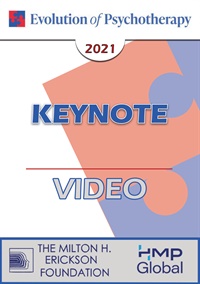
- Average Rating:
- Not yet rated
- Topic Areas:
- Art and Creativity | Keynotes | Therapist Development
- Categories:
- Evolution of Psychotherapy | Evolution of Psychotherapy 2021
- Faculty:
- Rob Kapilow
- Course Levels:
- Master Degree or Higher in Health-Related Field
- Duration:
- 1 hour
- Format:
- Audio and Video
- Original Program Date:
- Dec 02, 2021
- Short Description:
- "At the heart of psychotherapy is the idea that listening to someone is an inherently healing act. Can an understanding of the grammar of music help us better understand the grammar of how therapists can listen better and even advance therapeutic communication? Join NPR and PBS commentator Rob Kapilow a conductor/composer/author for a unique interactive exploration inside the language of music to see how it can help us learn to listen and communicate. Conducted by Kapilow musicians will play the final two movements of Haydn’s string quartet op 76/5. Learn to listen like Haydn. Learn the evocative grammar that underlies music.
- Price:
- $59.00 - Base Price
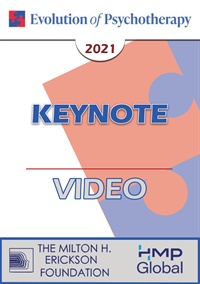
- Average Rating:
- Not yet rated
- Topic Areas:
- Art and Creativity | Keynotes | Psychotherapy
- Categories:
- Evolution of Psychotherapy | Evolution of Psychotherapy 2021
- Faculty:
- Irvin Yalom, PhD
- Course Levels:
- Master Degree or Higher in Health-Related Field
- Duration:
- 1 hour
- Format:
- Audio and Video
- Original Program Date:
- Dec 01, 2021
- Short Description:
- A Keynote featuring Irvin Yalom, PhD, from the 2021 Evolution of Psychotherapy Conference.
- Price:
- $59.00 - Base Price
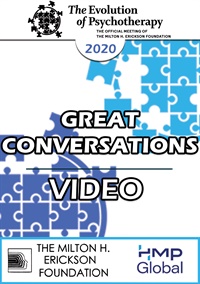
- Average Rating:
- Not yet rated
- Topic Areas:
- Gestalt | Great Conversations | Ericksonian Hypnosis and Therapy Techniques | Experiential Therapy | Psychotherapy | Art and Creativity
- Categories:
- Evolution of Psychotherapy | Evolution of Psychotherapy 2020
- Faculty:
- Erving Polster, PhD | Jeffrey Zeig, PhD
- Course Levels:
- Master Degree or Higher in Health-Related Field
- Duration:
- 1 hour
- Format:
- Audio and Video
- Original Program Date:
- Dec 11, 2020
- Short Description:
- Poetry and Presence: Each can lead to client change. This session explores the intersection of two experiential methods, gestalt practice and Ericksonian therapy.
- Price:
-
Sale is $29.00
price reduced from Base Price - $59.00
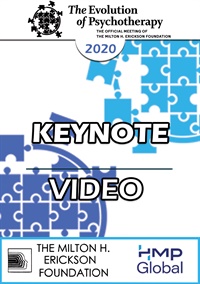
- Average Rating:
- Not yet rated
- Topic Areas:
- Art and Creativity | Training | Keynotes | Psychotherapy | Music | Therapist Development
- Bundle:
- EP20 Highlights
- Categories:
- Evolution of Psychotherapy | Evolution of Psychotherapy 2020
- Faculty:
- Jeffrey Zeig, PhD | Rob Kapilow
- Course Levels:
- Master Degree or Higher in Health-Related Field
- Duration:
- 1 hour 5 minutes
- Format:
- Audio and Video
- Original Program Date:
- Dec 10, 2020
- Short Description:
- At the heart of psychotherapy is the idea that listening to someone is an inherently healing act. Can an understanding of the grammar of music help us better understand the grammar of how patients communicate? Join NPR and PBS commentator Rob Kapilow for a unique exploration inside the language of music to see if it can help us learn to listen.
- Price:
-
Sale is $29.00
price reduced from Base Price - $59.00
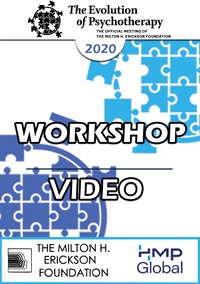
- Average Rating:
- Not yet rated
- Topic Areas:
- Trauma | Workshops | Art and Creativity | Social Psychology | Polyvagal Theory | Psychotherapy | Music | Psychology
- Categories:
- Evolution of Psychotherapy | Evolution of Psychotherapy 2020
- Faculty:
- Stephen Porges, PhD
- Course Levels:
- Master Degree or Higher in Health-Related Field
- Duration:
- 2 hours
- Format:
- Audio and Video
- Original Program Date:
- Dec 09, 2020
- Short Description:
- This presentation will focus on how Polyvagal Theory provides a plausible model to explain how and why intonation of voice and vocal music can support mental and physical health and enhance function during compromised states associated with illness, chronic stress, and trauma. The workshop will elaborate on the principles incorporated in the Safe and Sound Protocol™ and the lessons learned through preliminary clinical trials, current research, and feedback from clinicians applying the protocol to various clinical disorders including individuals with severe trauma histories.
- Price:
-
Sale is $29.00
price reduced from Base Price - $59.00
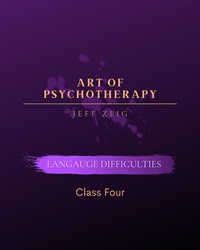
- Average Rating:
- Not yet rated
- Topic Areas:
- Clinical Demonstrations | Experiential Therapy | Psychotherapy | Therapist Development | Art and Creativity | Ericksonian Psychotherapy | Art of Psychotherapy
- Bundle:
- Art of Psychotherapy - Experiential Series
- Categories:
- Art of Psychotherapy
- Faculty:
- Jeffrey Zeig, PhD
- Course Levels:
- Master Degree or Higher in Health-Related Field
- Duration:
- 2 Hours 15 Minutes
- Format:
- Audio and Video
- Original Program Date:
- Jun 07, 2020
- Short Description:
- In our final class of this series, our demonstration subject has an impediment in learning the German language.
- Price:
- $79.00 - Base Price
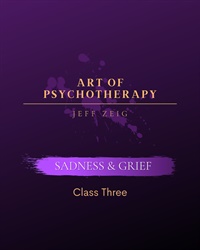
- Average Rating:
- Not yet rated
- Topic Areas:
- Clinical Demonstrations | Experiential Therapy | Grief | Psychotherapy | Therapist Development | Art and Creativity | Ericksonian Psychotherapy | Art of Psychotherapy
- Bundle:
- Art of Psychotherapy - Experiential Series
- Categories:
- Art of Psychotherapy
- Faculty:
- Jeffrey Zeig, PhD
- Course Levels:
- Master Degree or Higher in Health-Related Field
- Duration:
- 2 hours 22 minutes
- Format:
- Audio and Video
- Original Program Date:
- May 31, 2020
- Short Description:
- The presenting problem for Class 3 is an issue with expressing sadness and grief.
- Price:
- $79.00 - Base Price
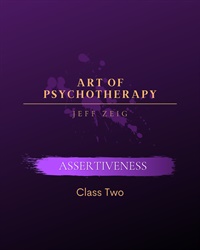
- Average Rating:
- Not yet rated
- Topic Areas:
- Clinical Demonstrations | Experiential Therapy | Psychotherapy | Therapist Development | Art and Creativity | Ericksonian Psychotherapy | Art of Psychotherapy
- Bundle:
- Art of Psychotherapy - Experiential Series
- Categories:
- Art of Psychotherapy
- Faculty:
- Jeffrey Zeig, PhD
- Course Levels:
- Master Degree or Higher in Health-Related Field
- Duration:
- 2 Hours 25 Minutes
- Format:
- Audio and Video
- Original Program Date:
- May 24, 2020
- Short Description:
- Our demonstration subject for Class 2 is a psychiatrist who would like to become a better leader.
- Price:
- $79.00 - Base Price
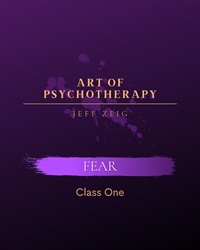
- Average Rating:
- Not yet rated
- Topic Areas:
- Experiential Therapy | Clinical Demonstrations | Phobia | Psychotherapy | Therapist Development | Art and Creativity | Ericksonian Psychotherapy | Art of Psychotherapy
- Bundle:
- Art of Psychotherapy - Experiential Series
- Categories:
- Art of Psychotherapy
- Faculty:
- Jeffrey Zeig, PhD
- Course Levels:
- Master Degree or Higher in Health-Related Field
- Duration:
- 2 Hours 5 Minutes
- Format:
- Audio and Video
- Original Program Date:
- May 17, 2020
- Short Description:
- The presenting problem for Class 1 is fear.
- Price:
- $79.00 - Base Price
Please wait ...

